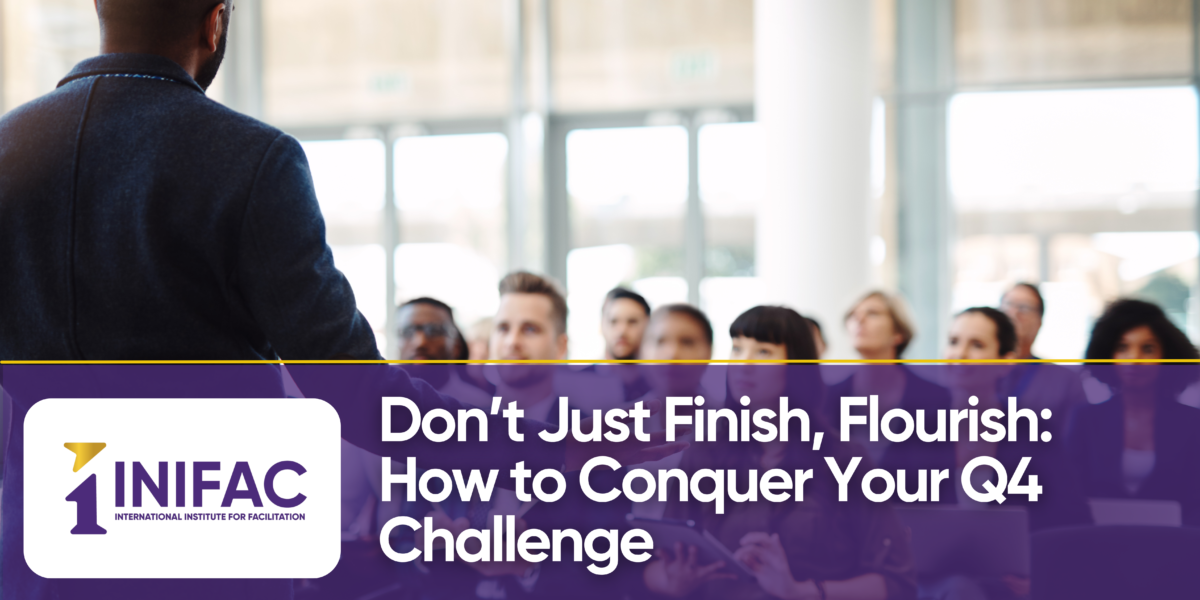
The final months of the year are upon us. For many, this time is a marathon toward the finish line, a last-minute scramble to wrap up projects and meet goals. But what if we saw the fourth quarter not as a finish line, but as a launch pad? What if we used these last few months to not only complete our work but to intentionally become better at it?
In the rush of year-end reports and planning for the future, it’s easy to fall into autopilot. But for facilitators, the end of the year presents a unique and powerful opportunity. It’s a chance to intentionally refresh a key part of your practice before the new year even begins.
The challenge is simple: pick one area of your facilitation practice to improve by December 31. This isn’t about overhauling your entire approach. It’s about a single, focused commitment to growth, trying a new tool, improving your conflict-handling skills, or creating a signature opening or closing activity. You get to choose your one thing.
So, how do you turn this intention into a reality? Here’s a three-part framework to help you tackle your Q4 challenge and truly flourish.
Step 1: Define Your “One Thing” and Why It Matters
Before you can make a change, you have to know what you’re changing. This isn’t the time for a vague goal like “be a better facilitator.” Instead, get specific. Your “one thing” should be a focused, measurable area for improvement.
-
Be Specific: Instead of “improve conflict handling,” a better goal might be “practice one new de-escalation technique in a real group setting.” Instead of “try a new tool,” aim for “use a virtual whiteboard to capture insights from a brainstorming session.” The more precise your goal, the easier it is to achieve and measure.
-
Connect to Your “Why”: Take a moment to reconnect with your purpose. Why did you choose this particular challenge? Are you tired of meetings starting with a lull? Maybe your one thing is to create a dynamic new opening activity. Are you feeling drained by difficult conversations? Perhaps your goal is to master a new communication technique. When your challenge is rooted in your personal purpose, you’ll be more motivated to see it through.
-
Embrace the Small Step: You don’t have to perfect this new skill in three months. The goal is simply to try it, to test it, and to learn from the experience. Success isn’t about flawless execution; it’s about the courage to take a small, intentional step forward.
Step 2: Create a Low-Stakes “Test and Learn” Plan
Once you’ve chosen your one thing, the real work begins. The key to making this work isn’t to over-plan but to create a simple, repeatable cycle of testing and learning. Think of it as a mini-experiment.
-
Commit to One Real Session: This is the most important part of the challenge. Don’t just read a book or watch a video about your new skill; use it in a live meeting or client session. This forces you out of your comfort zone and gives you real, immediate feedback. Choose a session where the stakes are manageable, but high enough to feel real. A team meeting with a familiar client, an internal workshop, or a pro bono session can all be great options.
-
Capture Your Reflections: Immediately after the session, take 15 to 20 minutes for a personal reflection. While the experience is fresh in your mind, ask yourself a few key questions:
-
What went well?
-
What didn’t go as planned, and why?
-
What surprised me?
-
What did I learn about the group or myself?
-
How will I adjust this for the next time?
-
This reflection is where the magic happens. It’s how a one-time experiment becomes a lasting part of your practice. It’s how you turn a single experience into a foundation for future growth.
Step 3: Celebrate the Win (Yes, Even the Small Ones)
As facilitators, we spend so much time helping others celebrate their achievements. It’s time to do the same for ourselves. Whether your experiment was a smashing success or a valuable learning experience, you took a bold step. You chose growth over comfort. That deserves to be acknowledged.
Celebrate the effort, not just the outcome. You might find that your new technique didn’t land perfectly, but you learned a lot about group dynamics. That’s a huge win! Perhaps you felt awkward trying the new virtual tool, but you now know how to troubleshoot it for next time. That’s progress.
By celebrating your personal growth, you’re building a habit of reflection and improvement. You’re teaching yourself that taking risks is worthwhile, even when the results are imperfect. This positive reinforcement makes it easier to try something new again and again.
As the leaves turn and the year draws to a close, remember the purpose of this challenge. It’s not about being perfect. It’s about being intentional. It’s about using this unique window of time to invest in yourself, to rediscover your spark, and to show up with renewed curiosity and courage. By taking on your personal Q4 challenge, you’re not just finishing the year strong—you’re preparing to launch into the new one even stronger.
